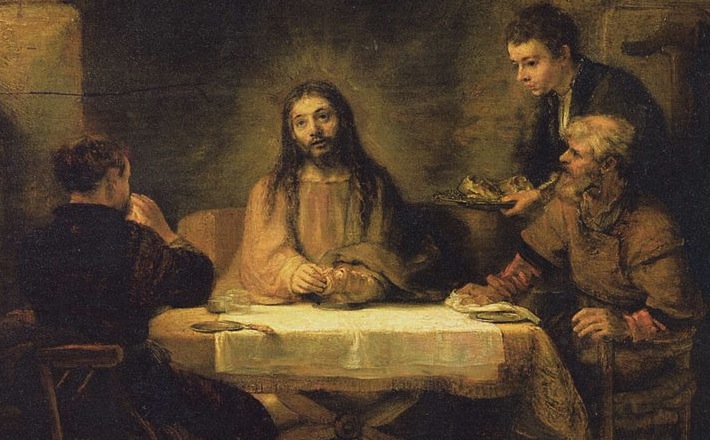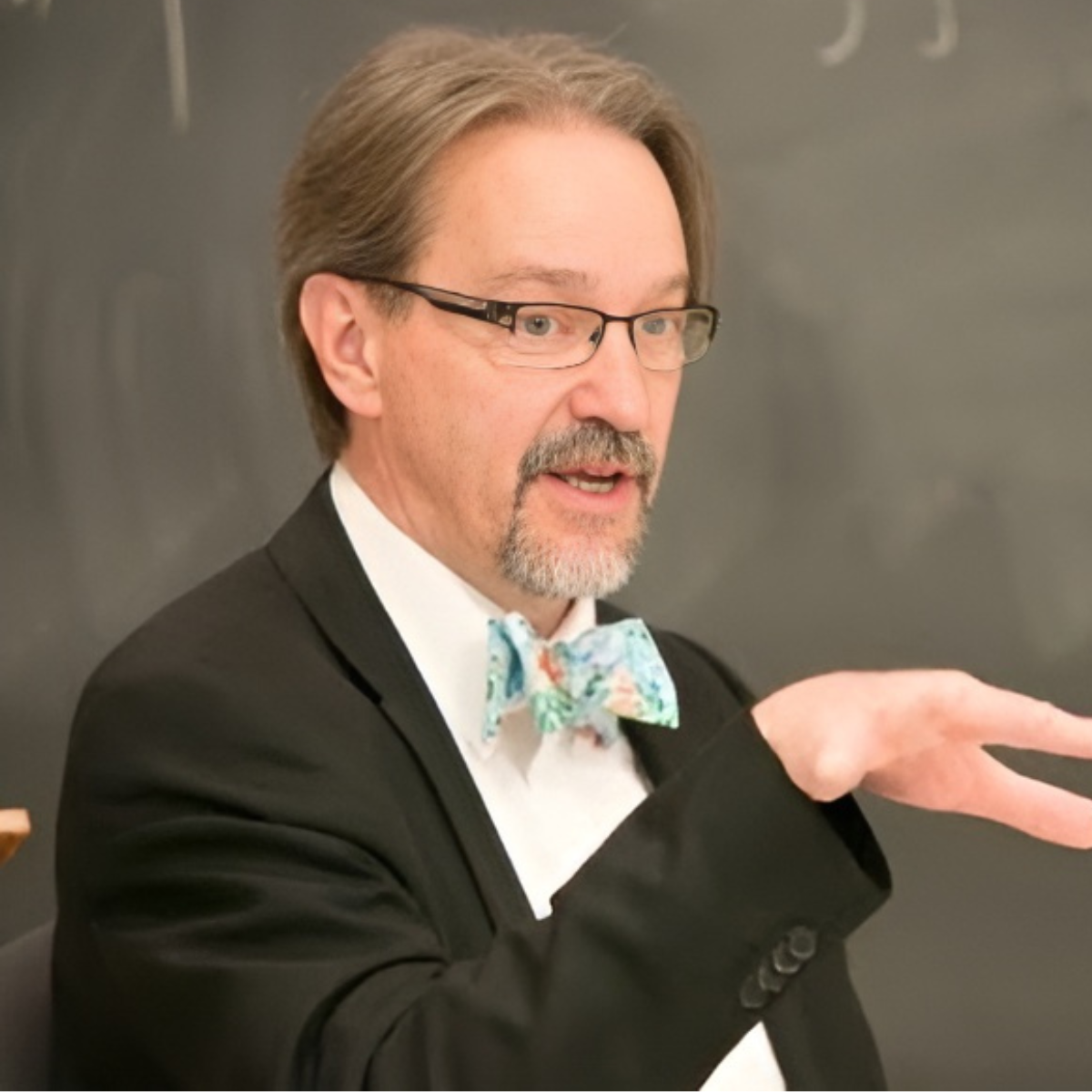Commentary on Luke 24:13-35
This is an odd scene.
Only Luke reports it, and only Luke needs it: Luke’s whole story is built around going to Jerusalem and coming back home (“every year … as usual” Luke 2:41f). This time people try to leave the Holy City, the center of the Jewish universe, only to be pulled back in.
The vocabulary in this scene is also odd, though that is normal for Luke, who frequently uses words found in no other gospel. For instance, the women who report the resurrection are dismissed when they speak to the male disciples. The NRSV says that the men dismissed it as an “idle tale” (Luke 24:11). The word in Greek implies that they dismissed the story as being no more important than “women’s trinkets.” Odd, and a little offensive.
And now, Luke tells us that the travelers (previously unmet and otherwise unknown) were “talking and discussing” about the things that had happened. The Greek implies that they were not only talking; they were “examining evidence together.” This picks up a theme that has been prominent in Luke’s story ever since we met Mary talking with Gabriel: she was confused to have encountered an angel, but not so confused that she couldn’t debate the issue back and forth. And when Jesus stays behind in the Temple, talking with the teachers, he (just like his mother) asks and answers analytical questions. This is a story loaded with rational discourse. The disciples walking to Emmaus fit right in.
But the most important aspect of this odd (yet familiar) scene, at least in this reading for me, is a small, utterly ordinary verb in the imperfect tense: hlpizomen (Luke 24:21). The NRSV translates this word as “we had hoped,” which is a perfectly good way to read this ordinary little verb.
The Greek imperfect tense suggests continuous action, perhaps because it took numerous attempts, or took a long time to complete, or was simply an old habit. To this is added a temporal augment (in this case, the lengthening of the initial vowel), which indicates that the action flows from the past. But is this action still going on? Or were the efforts, despite repeated attempts, finally abandoned? The tense doesn’t tell you, at least not so that the matter is fully settled. The storyteller helps make sense of this: they had been hoping that Jesus “was the one to redeem Israel,” but the events of the past days had brought an end to that habit of hoping.
For this, Jesus calls them “foolish and slow to believe.” Older commentators often pile on and blame them for imagining that the messiah would actually make a difference in the world, that the messiah, at a minimum, would be able to stand up against Rome, the representation of all that was wrong with the Jewish world in the 1st century. In this, older commentators are wrong. That’s a little like blaming a baseball manager for imagining that a shortstop would field grounders and throw the ball to first base. It’s a little like blaming a bereaved family for being astonished to discover that a surgeon played mumbley-peg on a patient instead of performing a proper operation.
You can extend these outrageous examples as far as you like, and it all comes down, in the end, to oddity. Shortstops field and throw. Surgeons excise tumors. And messiahs make a difference in the face of imperial violence. The walking disciples know that, and they are analyzing the situation carefully.
The scene, to be sure, ends with joy and excitement. It ends with them thrilled to discover that death and resurrection are deeply rooted in both Jewish Scripture and Jewish tradition, so that Jesus’ crucifixion actually fits into a pattern that can arguably be seen throughout God’s dealings with the Jewish people.
But the thing that catches my eye is that little imperfect tense verb: “we had hoped.” I have heard families use that phrase when they were packing up the things they had brought with them to the ICU. “We had hoped … ,” they say, and then they go home alone. I have heard families use this phrase when addictions return, or jobs go away. Although theologies of hope focus on a dawning future, the moment that catches me is that moment of deep disappointment, when only a painfully imperfect verb tense will express what needs to be said.
We like to hear future tenses. We like it when families say that everything will be okay, that they will go on, that they will get everything back to normal. We like future tenses so much that we reward people in deep grief for reassuring us that the sun will rise tomorrow and that life will go on. But in this unguarded moment, the walking disciples give voice to a discovery that every adult shares: very often, often when it matters most, we find ourselves speaking of matters of hope (and faith) in the imperfect tense: we had hoped … We can rally ourselves and polish up our future tenses when we must, but often that involves skating on thin ice over the shifting, flowing waters of past imperfections, confounding disappointments.
This is one of the things I love about the gospels: they know what we sometimes don’t dare to say. Crucial hopes have collapsed. Any congregation that gathers to hear a sermon will contain people who will hear the imperfect tense and will recognize it as a true statement of their current situation: we had hoped …
Those people will be waiting, listening to hear whether the preacher dares to acknowledge the reality of disappointment. If she does not, they will notice, and remember. They are listening also to hear whether the preacher simply uses that disappointment as a cheap set-up for the knockout punch of the gospel. If the preacher pretends that the resurrection easily and automatically overcomes all disappointment, they will notice, and conclude that the preacher doesn’t get it. They may even resent the preacher’s willingness to use their pain as a pretext for a cheap gospel sales gimmick.
The joy at the end of the scene is real, as is the racing report of the resurrection in the scene immediately prior to this one. Death and resurrection do indeed fit into a long-established pattern of the way God works in a world as unrelentingly real as this one is. But truthful preaching on this text requires an honest recognition of the reality of deep disappointment.
Don’t pretend to talk about resurrection unless you are willing to acknowledge the depths of deadly disappointment that make it necessary. Find something else to preach on, or find another (easier) way to make a living. Preaching resurrection requires honesty, and the truth is that “we had hoped … ” Maybe we still do. Some of us (sometimes) don’t, or can’t, or won’t hope, at least not yet. But we had hoped that you, as a preacher, would understand that.


May 4, 2014